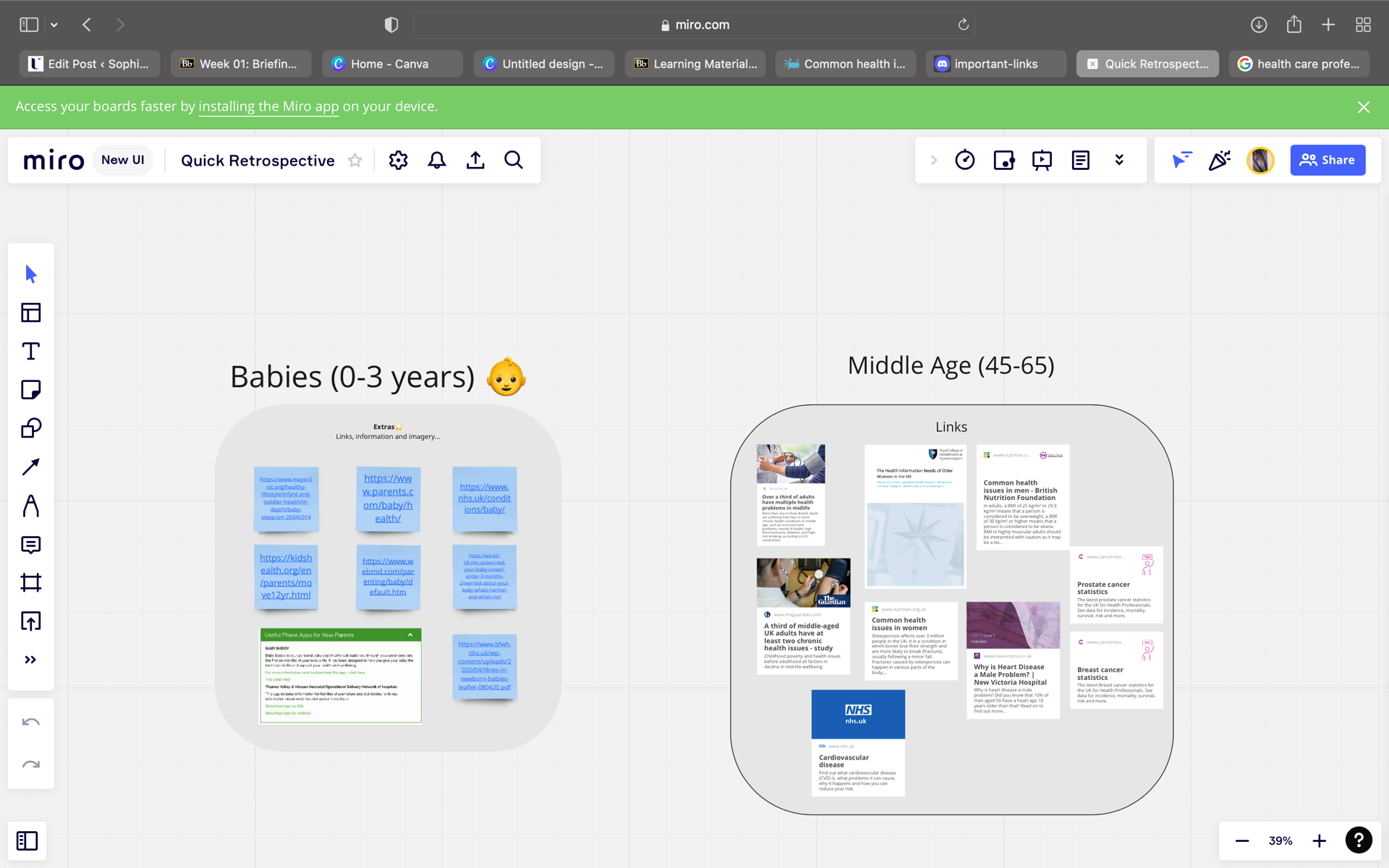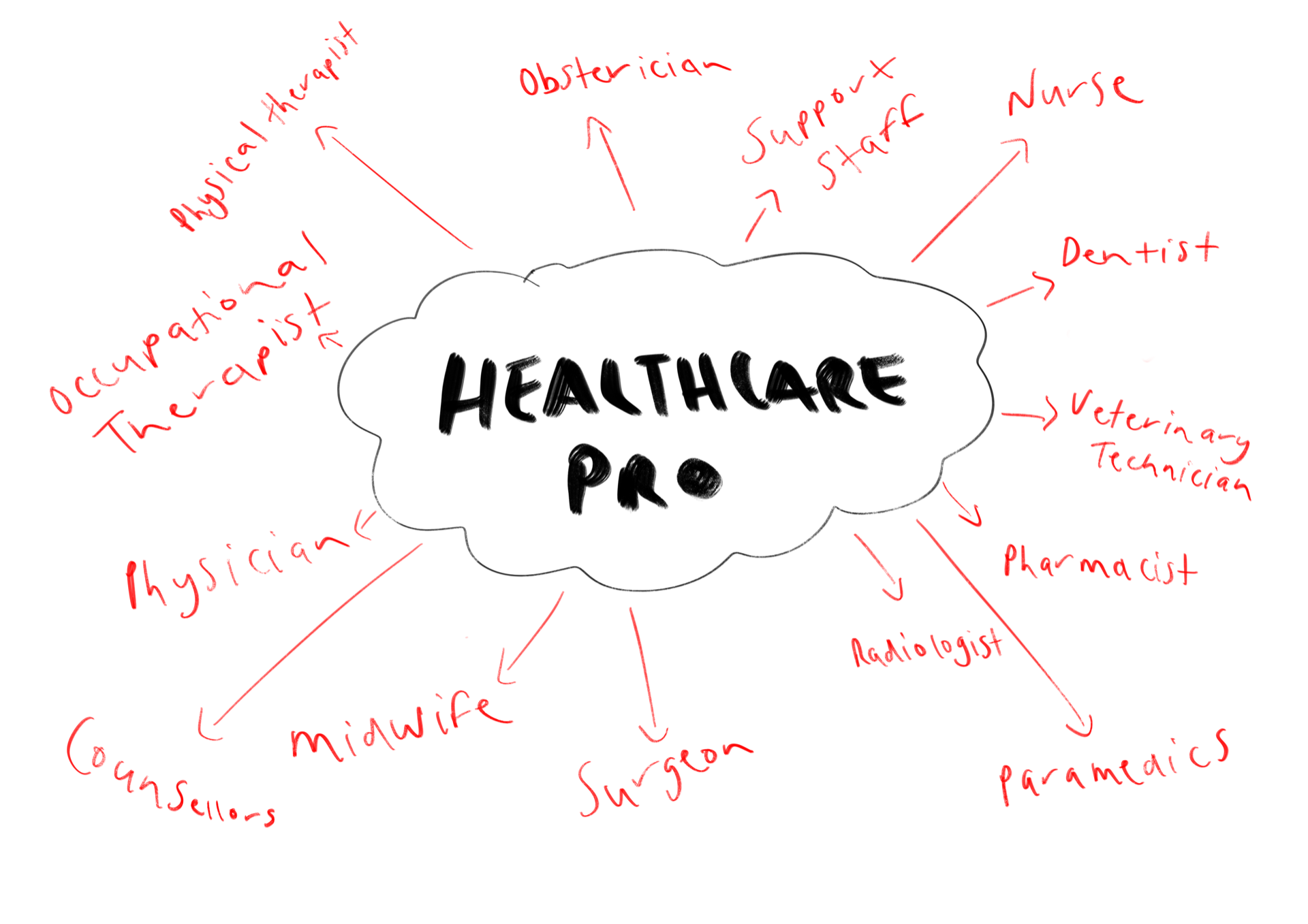Back to uni and back to my weekly tasks! Our first week with this new module with Paul, he assigned me into a team with Beth Buchannan, Emma McGurren, Laura Foy and Sean Downey to begin my research into the health service, care and systems out there as well as looking closely at the UX in this particular field.
 To begin our research Laura had messaged us in a group chat to discuss how we would move forward with this weeks task. A few of us put in some suggestions and ideas to conduct the research and our discussion. I put in the idea of moving over to teams as in the past this has been a strong tool to use in my past projects that focused on group and team work. Laura had suggested taking the task over to Discord which was something I hadn’t used before but with agreement in the team Laura set this tool up for us and sent us the link where she had organised this tool into separate channels to allow us to keep our research in particular areas. We also decided on looking into having a Miro board for linked work if needed to keep each of us in contact with each area of research. Emma set up our Miro board keeping our links of research in on organised board to allow us to search through each of our research gathered.
To begin our research Laura had messaged us in a group chat to discuss how we would move forward with this weeks task. A few of us put in some suggestions and ideas to conduct the research and our discussion. I put in the idea of moving over to teams as in the past this has been a strong tool to use in my past projects that focused on group and team work. Laura had suggested taking the task over to Discord which was something I hadn’t used before but with agreement in the team Laura set this tool up for us and sent us the link where she had organised this tool into separate channels to allow us to keep our research in particular areas. We also decided on looking into having a Miro board for linked work if needed to keep each of us in contact with each area of research. Emma set up our Miro board keeping our links of research in on organised board to allow us to search through each of our research gathered.
We discussed then in our Discord ‘General’ channel how we would begin conducting our research between the 5 of us. We decided to take the 5 age groups that included babies, children, teenagers, middle aged and elderly and each of us chose one to begin our own research. For the research we focused on looking closely at the health concerns with our specific group, the frustrations our group may face with the current healthcare systems and possible design methods and design for healthcare.

Healthcare Research – Middle Age
“Over a third of adults have multiple health problems in midlife”.
Middle Age is the period in adulthood that typically is placed between the ages of 45 – 65 and this phase of life is marked by gradual physical, cognitive, and social changes in the individual as they age. Known as Generation X are adults born in 1970 and with this they are at much greater risk of having multiple long-term health problems in their late 40s according to BMC Public Health.
A biomedical survey conducted by a nationally representative group of 8000 British adults participating in the 1970 British Cohort Study from birth, gathered data from measured their blood pressure and blood samples. With this the individuals reported also any chronic physical health conditions that were reassuring.
It’s recorded 1 in 3 British adults aged between 46-48, 34% of these adults are expected to suffer from two or more chronic health conditions in middle age, which typically includes back problems one in five (21%), high blood pressure one in six (16%), mental health under a fifth (19%), arthritis one in 13 (8%), asthma more than one in 10 (12%), diabetes one in 20 (5%) and high-risk drinking more than a quarter (26%).
This survey found that adult in this age range from the poorest back were 43% more at risk of having long-term health conditions in midlife in comparison to those at a more privileged lifestyle. These individuals were more at risk of also suffering from mental illness, arthritis and high blood pressure in their late 40s.
I decided for further research I would look closer into the most health issues that can be found in both males and females to showcase how each sex might be effected during their midlife stage.
Middle age women health issues:
Some of the most common health issues that can be found in women include:
- Irritable bowel syndrome (IBS) – This is a long lasting illness that affects the movements of the bowels and consist of discomfort in the abdomen area. It is estimated that IBS affects 1 in 5 people and there is twice as many women affected than men with signs of the beginning of the issue taking place between the ages of 20-30.
- Cardiovascular disease – This is related to conditions that affect the heart and blood session such as heart dies and risk of a stroke. Cardiovascular disease is one of the main causes of death/disability in the UK and is mostly common in older women than in men.
- Breast cancer – Breast cancer is the most comment cancer that is found in UK women with around 1 in 8 women being diagnosed with breast cancer in their lifetime and 1 in 5 of those diagnosed under the age of 50.
- Osteoporosis – This is a condition that deaerates the strength in your bones and affects over 3 million people in the UK and 1 in 2 women over the age of 50 can exercise this with the result of age and low bone strength.
- Overweight and obesity – The risk of becoming overweight or obese can cause further health issues such as type 2 diabetes, heart disease, risk of a stroke and types of cancers. With this can also increase the risk of back and joint pain, and linked with psychological problems, such as depression and low self-esteem. Specifically over weight women can have further issues when it comes to conceiving children and also at a higher risk of having complications during pregnancy, such as pregnancy diabetes, high blood pressure, miscarriage and the need for a C-Section delivery.
Middle age men health issues:
Some of the most common health issues that can be found in men include:
- Overweight and obesity – Health risks include high blood pressure and risk of cardiovascular diseases (heart and stroke), cancer types, sleep apnoea (breathing in sleep), type 2 diabetes. 28% of adults in England are obese and a further 36% are overweight
- Prostate cancer – This cancer in the UK is the most common cancer in men. The estimated lifetime risk of being diagnosed with prostate cancer is 1 in 6 (18%) for males born after 1960 in the UK. Cancer research article stated the following statistics 52,300 new prostate cancer cases in the UK every year,accounts for 27% of all new cancer cases in males in the UK, the last decade, prostate cancer incidence rates have increased by almost a tenth (8%) in males in the UK and most common in Black males, then White males and least common in Asian males.
- Heart disease/ High blood pressure- This is the leading and first cause of death in men in the UK. With heart disease this increases the risk of heart failure, stroke, coronary artery disease and other cardiovascular diseases. Men are more likely to develop heart disease than women in the UK with 1 in 7 meant dying from disease of the heart arteries in comparison to 1 in 11 women. This could be down to the risk of more challenging job roles, lack of understanding of health and diet, be more overweight than women and be less aware of symptoms.
Healthcare Professionals:
A healthcare professional is considered a fully qualified individual that fits into the category within the medical field. Below I created a mind map to note down some examples of healthcare professionals out there.

Overall I found this task as a group helpful and it was refreshing to be placed into a group that wanted to work together and was willing to organised task between the 5 of us to research. I am looking forward to chatting with my group face to face to see what other opinions and ideas they have that will allow each of us to push our research part of this task futher.
Links to research/statistics
https://www.nutrition.org.uk/life-stages/women/common-health-issues-in-women/?level=Consumer
https://www.newvictoria.co.uk/about-us/news/cardiovascular-risk-in-men/
https://www.nutrition.org.uk/life-stages/men/common-health-issues-in-men/
